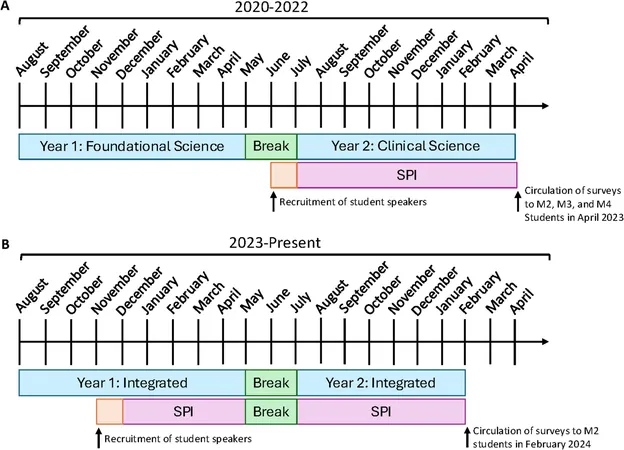
Revolutionizing Medical Training: How Personal Storytelling is Transforming Doctor-Patient Connections
2025-09-18
Author: Arjun
A New Era in Medical Education
In a groundbreaking approach to medical training, the Boston University Chobanian & Avedisian School of Medicine is breaking away from traditional lecture-based methods. Instead, they are embracing a powerful tool: personal storytelling. This innovative strategy is reshaping how future doctors learn about illness and connect with their patients.
Introducing the Student Perspectives Initiative (SPI)
At the heart of this transformation is the Student Perspectives Initiative (SPI), a program led by medical students that encourages them to share their own unique experiences with illness during relevant classroom discussions. For instance, a student diagnosed with Crohn's disease may present their journey alongside a lecture on inflammatory bowel diseases, providing authentic insights that enrich the learning experience.
The Impact of Personal Narratives on Learning
Recent research indicates that participation in the SPI program significantly enhances students' understanding and emotional engagement with patient care. From 2020 to 2022, participants in the program reported increased empathy and connection with their peers, demonstrating the effectiveness of storytelling as a learning tool in medical education.
A Shift in Curriculum and Engagement
With BU's updated curriculum now integrating basic and clinical sciences over one-and-a-half years, the SPI program has expanded its reach. In each academic year, around eight students voluntarily share their personal narratives in sessions that attract an audience ranging from 25 to 160 classmates, all facilitated by a faculty member for expert support.
Measuring Success: Insights from Students
To gauge SPI's effectiveness, researchers administered anonymous surveys exploring learning outcomes, emotional intelligence, and community building. These findings suggest that hearing firsthand accounts from peers not only teaches invaluable lessons but also cultivates a deeper understanding of the patient experience.
The Ripple Effect of Storytelling
Senior author Ariel Hirsch, MD, emphasizes how these narratives foster empathy and prepare future physicians for the emotional complexities of patient care. Such experiences have the potential to create a new generation of doctors focused on compassionate, human-centered care.
Storytelling: A Universal Tool for Connection
The researchers advocate for the broader application of personal storytelling beyond medicine. They propose that this approach can enhance understanding and community building in various contexts, from educational settings to workplaces. As Elyse Olesinski, MD, points out, sharing personal experiences not only teaches essential lessons but also forges stronger connections among individuals.
Conclusion: A Call to Embrace Empathy in Medicine
As the medical community embraces the power of personal stories, the potential for transformative learning and compassionate care is immense. By highlighting the human side of medicine, programs like SPI pave the way for a more empathetic future in healthcare, where understanding and connection are at the forefront.


 Brasil (PT)
Brasil (PT)
 Canada (EN)
Canada (EN)
 Chile (ES)
Chile (ES)
 Česko (CS)
Česko (CS)
 대한민국 (KO)
대한민국 (KO)
 España (ES)
España (ES)
 France (FR)
France (FR)
 Hong Kong (EN)
Hong Kong (EN)
 Italia (IT)
Italia (IT)
 日本 (JA)
日本 (JA)
 Magyarország (HU)
Magyarország (HU)
 Norge (NO)
Norge (NO)
 Polska (PL)
Polska (PL)
 Schweiz (DE)
Schweiz (DE)
 Singapore (EN)
Singapore (EN)
 Sverige (SV)
Sverige (SV)
 Suomi (FI)
Suomi (FI)
 Türkiye (TR)
Türkiye (TR)
 الإمارات العربية المتحدة (AR)
الإمارات العربية المتحدة (AR)